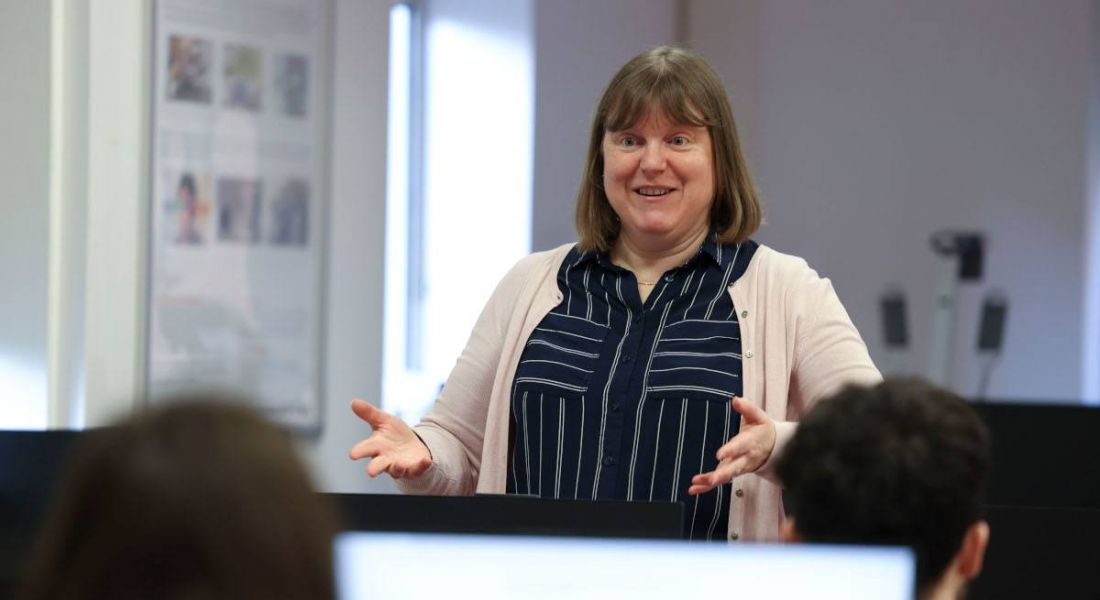DCU Futures is teaching students life skills as part of their courses so they can be better prepared for the ever-changing workplace environment.
The seed for Dublin City University’s DCU Futures programme was planted through conversations the college’s academics had been having with industry professionals from some of the major employers taking on DCU graduates.
Over the years, when the university asked for feedback about its graduates, the big professional services companies would often say that while the graduates were mostly top-notch, there was usually some extra training that needed to be done to get them used to the working environment.
Dr Louise Hopper, associate professor in DCU’s School of Psychology, has been involved in DCU Futures from the start.
SiliconRepublic.com asked Hopper to explain what the ambitious €19.9m Government-funded project has in store for graduates and for their employers.
Hopper said the programme’s overall approach to learning is encouraging students to develop what she termed “transversal skills” as opposed to transferable skills. Its tagline is “reimagining education for an unscripted world.”
“The idea of transversal skills, I look at it as being the new terminology for something that we knew before as transferable skills – you could call them life skills, work skills,” explained Hopper. “The kinds of things that if you’re good at these as an individual, and you have a good broad range of them, you can move very well from third level education into industry, but you can also move between industries.”
‘An unscripted world’
“We’re trying to look at what is it that our students need to know alongside their discipline knowledge to go out and be successful in the world.”
The need for graduates to be prepared for an unscripted world is something that takes on more urgency when we ask Hopper about technology and how tech education feeds into the programme.
Technology is changing the world of work at such an unprecedented pace that employers, academics and graduates all need a new approach to higher education.
“Our thinking is that we don’t really know what the workplace is going to look like in 10 years’ time. It’s changing really fast. We don’t know what technology is going to look like in 10 years’ time,” Hopper said.
The key to preparing students and graduates for these changes down the line is to teach them ways to improve their life skills. Much of the coursework done by students enrolled in DCU Futures programmes focuses on developing skills like communication, leadership, critical thinking, creativity, agility and digital literacy.
These are the transversal skills Hopper believes every graduate should have. As a psychologist and an educator, she is well-placed to make this judgement.
Using the university’s newly added degree in Psychology and Disruptive Technology as an example, Hopper explained that the course’s approach is “not just about having psychologists who are well-versed in technology as we understand it today.”
“It’s about thinking about what the likely impact on humans and human behaviour is of technology that is right on the cusp of state of the art and maybe even that we can’t quite imagine exactly how it’s going to be implemented yet.”
It’s clear from Hopper that DCU wants its graduates to not only be able to communicate confidently among their peers, but also to be able to make their ideas resonate with lay audiences.
Teamwork and other transversal skills
Science communication and teamwork are big parts of the sci-tech courses. They are also transversal skills that a lot of students have a certain level of “foreboding” around when they’re told they have to do a group presentation, said Hopper.
She and her colleagues teach the students techniques to deal with the problems that can arise from working as part of a team.
“Every year through the degree, they have at least one module where a significant part of the assessment is based on group work. So, students are continually getting to practise these skills and to work better as a group.”
“Traditionally, we would have had assessments that were maybe poster presentations, some oral presentations, but we’re now adding to that. We’re adding the idea of making presentations about their work or their research to a lay audience. So, almost like science communication to the general public and thinking about different audiences.”
Hopper thinks it is important that students learn these kind of skills and are exposed to these kind of real-world experiences, “so it’s not always the academic paper that they’re working towards.”
To prepare them for job interviews and funding applications in the future, students give oral presentations to lecturers and their classmates as a “challenge-based” assignment.
Psychology students might work on an app for workplace wellbeing and mental health, whereas students studying more tech-focused subjects might work on Hackathon-style projects together. Then they present their projects to an audience of their peers with lecturers role playing as members of the Irish Research Council or Science Foundation Ireland or the Health Research Board.
“We would almost play a role, like members of a funding body, and the team would come and present their proposals to us and we’d have a conversation about them,” said Hopper.
“That’s a very different type of assessment from something that we would have been doing before and it’s proving to be very successful, and the students seem to like it a lot.”
Different types of assessment driven by industry
The approach gives them a chance to put what they learn into practice, which makes their transition from third level to the workplace much more seamless for everyone.
Hopper pointed out that DCU has “always been quite close to enterprise” but the Futures programme has been developed very deliberately by the university in conjunction with industry.
Partners like Intel, Accenture, Alltech and Microsoft have been involved from the start. They have been “instrumental” in figuring out what the courses would look like.
The industry partners were able to tell Hopper and her DCU Futures colleagues valuable information like what kind of software students would be using in the workplace depending on their industry.
Learning curve for everyone
It was a learning curve for them, Hopper admitted.
“In psychology, for example, historically, we’ve used IBM’s SPSS as a package to do a lot of our statistical analysis, whereas actually in industry they use R – or a mixture of R and Python – but mainly R, and that’s actually a tool that was designed by psychologists so it makes no sense that we’re not using that.”
Thanks to tip-offs like these, DCU’s courses are changing and updating to be in line with what’s actually used in practice.
Hopper said that such is the success of the industry-academia collaboration, she wouldn’t be surprised if some of the partners become adjunct academics or adjunct professors to the college.
In the meantime, students don’t need to rely solely on academics to be their channel of communication with industry. As well as their academic learning, they do work placements with companies.
Hopper hopes this aspect will help students see how workplaces and academia can work together in a practical way to solve real-world problems in the future.
10 things you need to know direct to your inbox every weekday. Sign up for the Daily Brief, Silicon Republic’s digest of essential sci-tech news.




